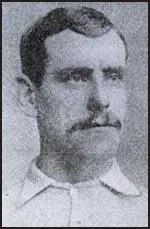John Winning Murray

John Winning Murray was born in Strathblane, Scotland on 24th April 1865. He played as a defender for Cowdenbeath and Vale of Leven in the Scottish League. 22 Mar 1890
On 22nd March 1890 he won his first international cap playing for Scotland against Wales. Scotland won 5-0. Soon afterwards Murray joined Sunderland in the Football League. In doing so, he brought an end to his international career as at this time Scotland did not select men playing in England.
Murray played 41 games for Sunderland before joining Blackburn Rovers. Two other Scottish players, George Anderson and Harry Marshall joined at the same time. That year Blackburn Rovers finished in 9th place in the league. 28,000 spectators watched Blackburn Rovers beat Sunderland, 3-0 in the 3rd round of the FA Cup. Unfortunately Blackburn lost 2-1 in the semi-final to Wolverhampton Wanderers.
Tom Mitchell, the secretary of Blackburn went back to Scotland to improve his squad. Adam Ogilvie was signed as the new goalkeeper. He joined fellow Scotsmen, Johnny Murray, Harry Marshall, George Anderson, Johnny Forbes, George Dewar, Coombe Hall, Tom Brandon and Harry Campbell in the side.
Blackburn's defence was now completely made up of Scotsmen. However, the club did have three talented Englishmen in the forward line: Harry Chippendale, Jimmy Whitehead and Jamie Haydock. In fact, Chippendale and Whitehead both obtained their first international caps in March 1894 in a game against Ireland. That year Blackburn finished in 4th place in the First Division of the Football League.
Murray left Blackburn Rovers in 1895. During his time at the club he played in 109 games.
John Winning Murray died in 1922.
Primary Sources
(1) Mike Jackman, Blackburn Rovers : An Illustrated History (1995)
In defence, Johnny Murray was signed from Sunderland to replace full-back Mick McKeown, who returned to Scotland to join Cowlairs... After an opening day win (in the 1892-93 season), a narrow 4-3 victory over Newton Heath at Ewood Park, the Rovers then began on a sequence that brought five draws and five defeats from their next 10 League games. It was during the later stages of this sequence that Tom Mitchell was again dispatched to Scotland to find players of genuine quality. Within a matter of a month the club had made several significant signings. George (known as Geordie) Anderson was signed from Leith Athletic to occupy the centre-half position, while Harry Marshall, an outstanding Scottish international half-back, was signed from Hearts.
